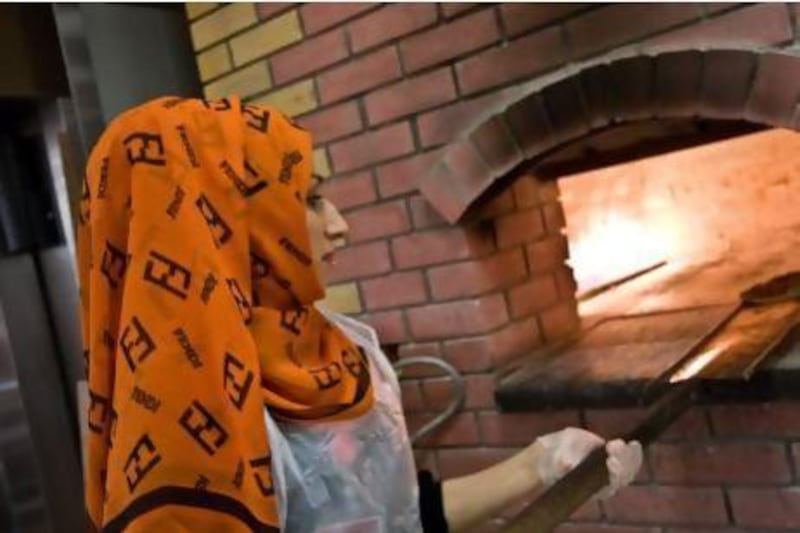What does it take to run a successful private company that includes a healthy proportion of Emiratis in its workforce?
One of the most successful is the Dubai supermarket chain Aswaaq, which has targeted the hiring of UAE nationals since it was set up in 2007.
Aswaaq was singled out by Sheikh Mohammed bin Rashid, Vice President and the Ruler of Dubai, as an example of a company that supports the local community by providing job opportunities.
While it brought in overseas consultants when setting up, it now has an Emirati board of directors and has hired many nationals to work in its seven supermarkets in the city.
Many of the stores are based in districts with a high proportion of citizens, such as Al Mizhar, Al Warqa and Nadd Al Hamar.
Shamsa Lootah, the human resources manager at Aswaaq, says hiring nationals has “raised awareness of the importance of the proliferating retail sector” among local workers.
Ms Lootah admits the idea of working in a supermarket does not appeal to many Emiratis.
“The stereotypes entrenched in the minds of many Emiratis cause them to look down on jobs in retail,” she says.
“We came across many jobseekers who refused to work in retail and we made great efforts to raise awareness about the importance of having Emiratis working in this sector through a number of visits to various colleges and universities.
“Many Emiratis [now] consider a job in retail as a stepping stone to better opportunities at the international level after they have acquired some experience.”
Salaries are another problem, Ms Lootah says. “Many Emiratis who apply to work for us expect to receive the same salaries offered in the public sector,” she says.
“As everybody knows, this is not possible because the work of private companies is based on the principle of profit and loss, and wages are determined according to labour-market needs.”
But what Aswaaq has is a full-time programme that trains workers in all facets of retail, from customer satisfaction, receiving deliveries and stocking shelves, to more senior management roles.
At present the company has about one in five positions filled by Emiratis at its headquarters and hopes to increase this as it expands.
“Emiratisation is our priority,” Ms Lootah says. “Supporting the local community in all possible sectors is one of our goals, and it is also part of the social responsibility of the company.
“We at Aswaaq also believe that it is important for Emiratis to engage in the public sector and in the private sector as well.”
Aswaaq has fully Emiratised its senior management and is now pushing to widen this to other areas of the company, which it admits is more of a challenge.
One initiative allows students to come to the company to complete projects, giving them an inside view of the retail sector.
Fatima Al Shaibani, head of marketing and communications, says that after five years at Aswaq, she is confident that “Emiratis have the opportunity to show their potential and prove their competence.”
She adds: “Their interaction with other employees from different nationalities helps them increase their competitiveness and raise their productivity.
“There is a good relationship between management and staff and this motivates employees to do their very best.”
Ms Al Shaibani joined the company as a graphic designer but has since been promoted.
“I believe that my work in the retail sector is a challenge for me, especially in that it is a new field in which we do not find many Emiratis,” she says. “Working in the retail sector is as important as working in other fields and it provides great development opportunities.”
Fuad Al Najjar is a senior asset director with Al Futtaim Group, with responsibilities for shopping centres including Deira City Centre, Ajman City Centre, Fujairah City Centre and one in Bahrain.
The group, Mr Al Najjar says, strictly follows the Emiratisation policy endorsed by the company’s chairman and founder, Majid Al Futtaim.
“We try to hire people from the countries where we run our businesses, especially in commercial centres,” he says.
“I can say that we are committed to Emiratise all positions, especially leadership posts, by offering good packages and motivating all Emiratis to join our group.
“We have managed to Emiratise many areas of our business, like the shop-leasing department, the shop-design department and the finance, marketing and HR departments, in addition to project management and development.
“We have managed to alter the idea entrenched in Emirati consciousness about the private sector by providing our Emirati staff with high-quality training and giving them the prerogatives that help them do their jobs properly.
“I should also say that we attract Emirati staff because we provide them with the opportunity to advance their careers.”
Mr Al Najjar prefers to regard the task of persuading more citizens into the private sector as a challenge, rather than a problem.
“The main challenge that hampers our Emiratisation policy is the reconciliation between opportunities and wishes, in the sense that we offer many job opportunities to Emiratis, but they seem not to be willing to join us and work hard to reach high positions,” he says.
“Although we managed to interview many Emirati nationals and recruit some of them, we still cannot convince them to work in the private sector where the personnel are sometimes required to work for many hours, respect time and develop individual skills.”
In the end, he says, both the private and public sector have advantages and disadvantages.
“But I still believe that working in the private sector is better than working elsewhere, because it gives one the opportunity to advance one’s career more rapidly.”






